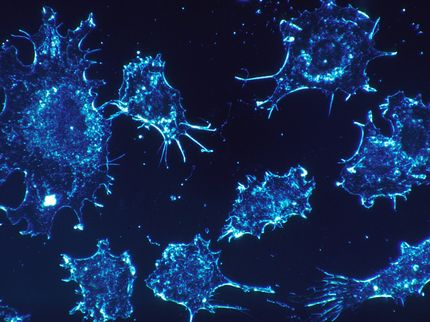Turncoat protein regulates sensitivity of breast cancer cells to drug
A surprising, paradoxical relationship between a tumor suppressor molecule and an oncogene may be the key to explaining and working around how breast cancer tumor cells become desensitized to a common cancer drug, found researchers at the Perelman School of medicine at the University of Pennsylvania. The drug, lapatinib, activates the suppressor called FOXO, in HER2+ breast cancer cells, but then FOXO becomes a turncoat molecule, working with an epigenetic regulator that controls gene expression. This drug-triggered relationship induces the expression of the oncogene c-Myc, leading to reduced sensitivity to the cancer drug and eventually relapse. They published their cover article in Cancer Cell.
"We found that an epigenetic pathway is crucial for growth of HER2+ cells and this epigenetic factor reduces sensitivity of the cancer cells to lapatinib, a HER2 inhibitor," said senior author Xianxin Hua, MD, PhD, a professor of Cancer Biology. "We need to understand how the body initially responds to these drugs and why there is a relapse and devise a new tool to fix that."
Human epidermal growth factor receptor 2 (HER2) is upregulated in a subset of human breast cancers. The HER2 pathway is mutated in many cancers, which drives tumors, but inhibitors of this pathway, such as lapatinib, have only limited success because cancer cells quickly adapt.
FOXO was normally thought of as the "good guy" molecule that controls cancerous cell growth, while c-Myc, the cancer-promoting molecule, the "bad guy." However, FOXO becomes the agent that desensitizes cells to cancer drugs, so this "good guy" molecule is converted to a "bad guy," during the treatment of the cancer cells with the anti-cancer drug.
"Now that we know about this triangle among FOXO, c-Myc, and the epigenetic pathway, we can stop c-Myc with an epigenetic inhibitor," Hua said. "Multiple epigenetic regulators participate in the drug-desensitizing pathway, so they could serve as new targets to improve therapy for this type of cancer."
The findings uncovered an adaptation pathway comprising the normally antagonizing molecules FOXOs and c-Myc, which are regulated by epigenetic compounds. Unraveling this complex interaction now gives researchers another point in the HER2 cancer pathway to hit.
Organizations
Other news from the department science

Get the life science industry in your inbox
By submitting this form you agree that LUMITOS AG will send you the newsletter(s) selected above by email. Your data will not be passed on to third parties. Your data will be stored and processed in accordance with our data protection regulations. LUMITOS may contact you by email for the purpose of advertising or market and opinion surveys. You can revoke your consent at any time without giving reasons to LUMITOS AG, Ernst-Augustin-Str. 2, 12489 Berlin, Germany or by e-mail at revoke@lumitos.com with effect for the future. In addition, each email contains a link to unsubscribe from the corresponding newsletter.


















































